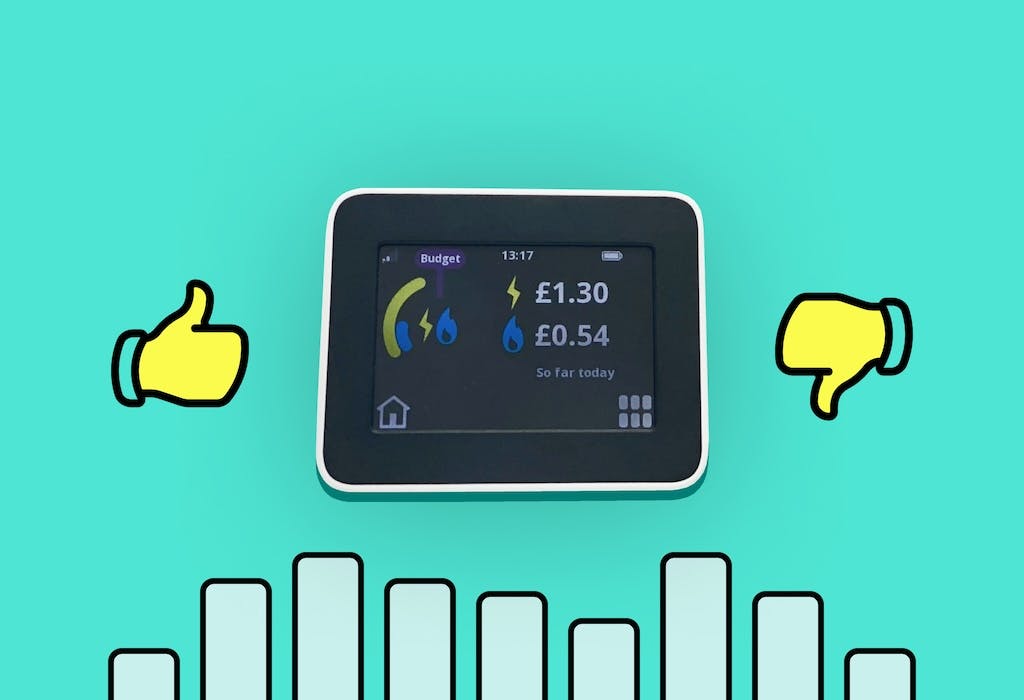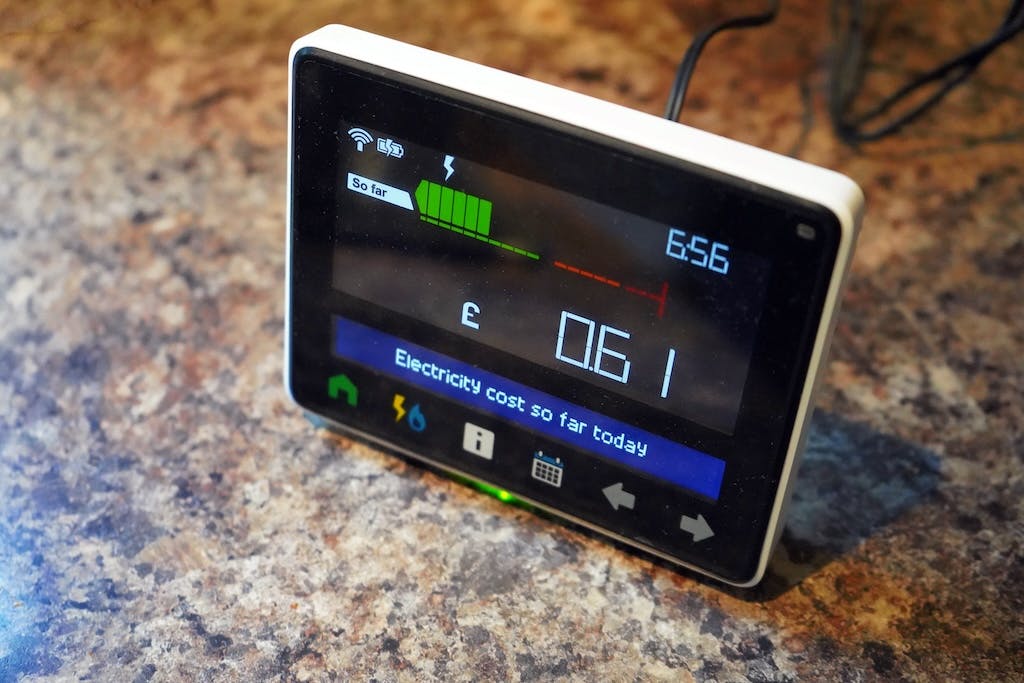Are smart meters any good?
Thinking of getting a smart meter for your home? Find out about their key advantages and drawbacks.
Written byMelody Abeni

Calculate savings
What kind of home do you live in?
Calculate savings
What kind of home do you live in?
🌞 Smart meters give you access to the best solar export tariffs
🏠 Around 60% of UK households have a smart meter
⚡86% of smart meter users have adopted better energy habits
Smart meters are a vital tool for any country that wants to tackle the carbon emissions of its housing stock.
And with the number of smart meters installed worldwide estimated at just over 1 billion (IoT Analytics, 2024), it’s clear that this technology has widely recognised benefits.
However, smart meter deployment still has further to go in the UK; just over 60% of households have one, and there are still people who view them with suspicion.
Read on as we examine the pros and cons of smart meters, and discuss whether it’s worth getting one.
Find out how much you can save
What kind of home do you live in?
What is a smart meter?
A smart meter is a digital device with wireless connectivity that measures your home's energy consumption like a traditional meter, but with added capabilities to help you understand your usage in real-time.
The meter automatically sends this data to your energy supplier, eliminating the need for you to carry out manual readings. They also tend to be more accurate than a traditional meter, which means you only pay for the energy you actually use.
The smart meter communicates with an In-Home Display (IHD), which is what many people think of when they hear the words ‘smart meter’. This is a small, portable screen that gives you a visual on how much energy you're using at that very moment.
But this IHD isn't the smart part - it's the meter that does the clever work of gathering and transmitting your energy data.
What are the benefits of a smart meter?
With smart meters, you can see how much energy you're using in real-time, which helps you save money and be more eco-friendly. Plus, if you have solar panels, a smart meter will allow you to earn extra cash from your surplus electricity.
Let's explore these advantages in more detail:
- You'll save on energy bills
- You'll reduce your carbon footprint
- You'll get access to solar export tariffs
- Your energy bills will be more accurate
- You won't have to take meter readings
You'll save on energy bills
A smart meter won’t directly reduce the amount of energy you use, but via the IHD it will increase your awareness of your usage. And this, in turn, will encourage you to make smarter choices at home.
For instance, you might use your tumble dryer at 5pm, glance at your IHD at 6pm, and get a shock at how much money you’ve spent in an hour. This might make you think about using your tumble dryer at a different time of day in future.
According to Smart Energy GB, a whopping 86% of smart meter users say they've changed their energy habits for the better, saving both money and the planet.
You'll reduce your carbon footprint
When you use a smart meter to track your energy use at home, you're helping fight climate change by cutting down on your carbon footprint.
This is important, as households are a significant source of carbon emissions. In the UK, residential energy use accounts for approximately 17% of the country’s total carbon emissions.
Just under 44% of the UK's electricity in 2023 came from non-renewable sources, which is still a significant proportion. Gas-fired power plants, for example, accounted for 32% of the electricity generated. But by cutting down on grid usage, we can decrease our carbon emissions and move towards a greener future.
You'll get access to solar export tariffs
A smart meter opens the door for you to benefit from solar export tariffs. If you have solar panels, these tariffs pay you for the excess electricity you generate but don't use, which is then fed back into the grid.
The vast majority of export tariffs will require you to have a smart meter before you can start exporting, otherwise there’s no accurate way to measure your activity.
Since the upfront cost of solar panel installations can be high, a smart meter helps you get the most from your solar investment – after all, a typical UK household can earn £345 per year in solar export income.
This figure is based on a home using 3,400kWh of electricity per year (which is the UK average) with solar irradiance of 850kWh/kWp, a 4.6kWp solar PV system, and a 5.2kWh battery.
The home is signed up to British Gas Export and Earn Plus for export, British Gas Electric Driver for import, and exports 65% of its solar electricity.
To learn more, check out our guide to how smart meters work with solar panels.
Verified expertWith real-time energy monitoring and access to a diverse range of tariffs, smart meters help you find ways to save money - and you can pair it with a free energy-saving tool like the Loop app for even more savings. Plus, it preps your home for green tech like solar panels, ensuring you get accurate readings for the Smart Export Guarantee, which pays you for any extra solar energy you produce.
Dr. Steve Buckley
Energy Doctor and Head of Data Science at Loop
With a background in statistics and data science, Steve is in charge of product direction at Loop and has worked at multiple successful startups.
Your energy bills will be more accurate
Old-school metering systems often guess your energy bill because they rely on inconsistent manual readings. But a smart meter records your energy use in real-time and sends it directly to your provider.
This means your bills reflect your actual energy consumption, not an estimate, so you’re only paying for what you’ve actually used.
You won't have to take meter readings
Traditional meters make you do the work of recording and sending readings to your energy supplier, a task that can be time-consuming and confusing. With a smart meter, it's all automated.
This means you no longer have to worry about making mistakes with your readings, which makes energy management a lot more straightforward and user-friendly.

What are the disadvantages of a smart meter?
Smart meters come with a whole host of benefits alongside barely any disadvantages. Here are the only two worth mentioning:
- You'll need to be covered by the DCC network
- There are no automatic savings
You'll need to be covered by the DCC network
Smart meters do not use WiFi - instead, they rely on a secure mobile network to send data between homes and energy suppliers, which is owned and operated by the Data Communications Company (DCC).
Whilst the DCC covers the vast majority of the country (99.3%) , it doesn't cover every square inch, which means there is the tiny possibility that you don't live in area that can support smart meters.
However, it is a myth that areas with poor mobile signal are not suitable for smart meters.
There are no automatic savings
While smart meters save you time and effort by doing the heavy lifting of tracking your energy consumption, any resulting cost savings aren't automatic. You'll need to proactively use the data provided by the smart meter to adjust your habits for potential savings.
However, smart meters are free, so there is never any cost to ‘recover’ in the first place.
Find out how much you can save
What kind of home do you live in?
How can you get a smart meter?
Getting a smart meter is straightforward (and free). First, you need to contact your energy supplier, as they're responsible for providing and installing the smart meter. Use Smart Energy GB's search tool to find your supplier's contact details.
The supplier will arrange an appointment for a professional to install the smart meter at your property. The installation process is quick and easy, usually taking less than two hours - but be prepared for your power to be switched off for a short while during this time.
How many UK households have a smart meter?
According to government data, at least 60% of all households in the UK had a smart meter installed at the end of September 2023.
This equates to around 32.4 million smart meters (as of February 2024) - with 18.2 million of these being electricity meters, and the remaining 14.1 million being gas meters.
If you have a smart meter installed, it’s usually the case that you will actually get two (one for electricity and one for gas), but there is only one IHD. However, households that aren’t connected to mains gas can only get a smart meter for electricity.
Has the smart meter rollout been a success?
The smart meter rollout in the UK began in 2011 and has taken a lot longer than initially expected.
The installation of smart meters in every home and small business was supposed to be completed by 2020, but has since been delayed until the end of 2025 because of some challenges along the way.
First-generation smart meters had their fair share of technical issues, and some suggest that more needs to be done to help educate the public about the benefits of having a smart meter.
Despite these issues, there has been significant progress, with over 60% of UK households now having a smart meter installed.
Are smart meters worth it?
Ultimately, the decision to install a smart meter is a personal one, and it's important to weigh the benefits and drawbacks before making a choice.
If you prefer having control and visibility over your household usage, smart meters are a good idea for both peace of mind and access to extra financial benefits, like solar export tariffs. Having a more efficient, convenient, and potentially cost-saving energy monitoring system makes smart meters a worthwhile addition to any household.
Smart meters: FAQs
Is there a downside to having a smart meter?
Modern smart meters barely present any downsides whatsoever.
Perhaps the only significant one is that smart meters don’t automatically lower your bills - it depends on the homeowner actively adjusting their usage. However, according to Smart Energy GB, 86% of smart meter users say they've changed their energy habits for the better, saving both money and the planet.
Historically, smart meters often lost functionality whenever a homeowner switched energy providers, but the new generation of smart meters (SMETS2) don’t have this issue.
What’s more, the majority of older smart meters (SMETS1) have been remotely switched onto the national communications network (run by the Data Communications Company, or DCC) , which means they keep working if you switch energy suppliers.
Do smart meters have any data privacy concerns?
Smart meters use a secure private wireless network and only store and transmit information about your data usage, rather than personally identifiable information, so there's a very low risk of your sensitive information being shared with unauthorised third parties.
You can also choose how often readings are sent to your supplier and, under data protection regulations, your historic energy data can't be used for marketing without your permission.
Is it a good idea to go with a smart meter?
A smart meter is usually a helpful addition for any property, as it shows you exactly how much energy you're using - which could mean lower bills in the long run. It also simplifies the meter reading process so you avoid those annoying estimated bills.
Importantly, if you generate your own electricity (e.g. via solar panels), a smart meter gives you access to export tariffs, allowing you to earn money back for the surplus power you feed into the grid.
Do you pay more with a smart meter?
Getting a smart meter doesn't automatically mean higher energy bills - it doesn't change how much your energy supplier charges for gas or electricity.
Instead, it is likely to reduce your spending.
A smart meter is free to install and it helps you see your energy usage in real-time, which encourages people to use less gas and electricity at peak times, and instead shift their consumption to cheaper, off-peak times.

Written byMelody Abeni
Based in London, Melody is a specialist green technology writer who has been covering sustainability, climate action and ESG for the past five years, after gathering operational experience in green investing and financial services. She has written for various industry publications, including renewable technology advisor The Eco Experts, and she holds a Master’s degree in law from Birkbeck University.
